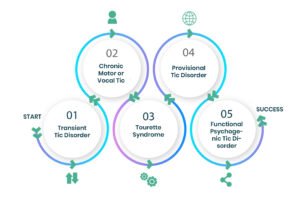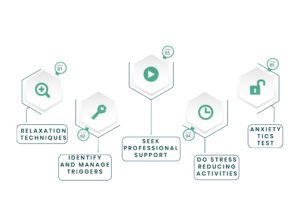Anxiety tics are brief, repeated tracks or sounds that take place as stress or worry accumulates. It may resemble wiggling his eyes, a twitching shoulder, or a little bursting, which you cannot prevent. It may be hard to control these tics, which may appear in busy or stressful conditions, and they end up unable to remain calm or concentrate on the task at hand. These are not dangerous, but may cause shyness and uncomfortable feelings towards other people.
The positive news is that salvation is in sight. In understanding what causes these tics and applying cures such as therapy, relaxation therapy, and healthy habits, you will be able to relax and be in control once more. Similar to Minia, intense physical activities, meditation, and routine sleep make stress less and tics less common.
What Are Anxiety Tics?
Anxiety tics are sudden and repetitive acts or sounds that happen when one is in a state of extreme nervousness or a stressful environment. One can give the example that a person may wink, twitch, or clear their throat without any intent. These tics are automatic and can occur and disappear, especially when the level of anxiety is enhanced. They can get out of control, which can make one more worried or embarrassed.
Besides, during stressful events, anxiety tics are more prone, and through relaxation, they are easily alleviated. It is necessary to remember that this kind of tic is not bad, but can be annoying. Therefore, elements of stress can be reduced through the course of time, learning how to cope with them, through breathing deeply, exercising regularly, or meeting with a mental health expert.
Anxiety Tics Symptoms
The symptoms of the tics of anxiety are the following:
- Blinking or rapid movement of the eyes.
- Faces twitch like nose wrinkling, lip jerking.
- Sharp jerks of the head or shrugging of the shoulders.
- Uncontrolled, such as the humming or grunting sounds.
- Better when relaxed and worse when stressed.
Types of Tic Disorders

Transient Tic Disorder
This is a form of tic disorder that manifests itself in short bursts, usually not longer than a year, then vanishes. It is much more prevalent among children and may include such simple movements as blinking, squirming of the shoulders, or even twitching of minor features. These tics are not dangerous, and sometimes they may self-heal and do not warrant treatment. Stress or excitement can increase them, but being calm and reassuring can decrease them.
Chronic Motor or Vocal Tic Disorder
This condition presupposes the duration of tics for more than a year. They can be movement tics, e.g., head jerking or twitching of a face, or sound tics, e.g., throat clearing, coughing, or humming. The tics are periodic and may improve when one is stressed out or exhausted. They do not harm, and can be annoying or shameful. Simple therapy and means of relaxing allow them to be controlled.
Tourette Syndrome
Tourette’s Syndrome occurs in cases where movement and sound tics occur within a duration of over one year. An individual can blink, shrug, or twitch during the time they make some sounds, such as humming or sudden words. It may begin at an early age when one is a child, and it may be mild or severe. Tics may be aggravated by stress, excitement, or even fatigue, and many individuals improve as they age. Family, doctor, and therapy support could ease its burden.
Provisional Tic Disorder
This kind occurs when tics appear for less than one year and cannot be classified under other kinds. It is not severe and is common among children. The tics can consist of both small movements and sounds that appear and disappear. The majority of them improve without treatment. Routine examinations may be used to monitor whether or not the tics persist.
Functional (Psychogenic) Tic Disorder
This disorder develops as a result of stress or an unpleasant emotional experience, rather than a brain issue. The tics may be regular tics, but they may be abrupt and alter in nature. They tend to be more intense when one is in a bad mood, and they are less serious when one is relaxed. To enhance the tics, one can discuss the problem with a therapist and inquire about the means to relax.
Can Anxiety Cause Tics?
Yes, tics, sudden and short repetitive movements or sounds that cannot be properly controlled by an individual, can be a result of anxiety at times. When one is extremely stressed or anxious, they tend to twitch, overlink, or utter noise. They are mostly provoked by the load on the body of the brain and the muscles, and extra tension makes it difficult to stay calm.
Moreover, the intensity of the nervous system increases along with the level of anxiety and may heighten or make tics more severe. Therefore, a person can notice these tics during stressful situations when examining or delivering a speech, or when a significant life change has occurred. However, with the proper type of care, whether it is by relaxation techniques, therapy, or medications.
Anxiety Tics Examples
The following are just some of the common examples of anxiety tics that can be experienced by people:
- Blinking eyes- blinking at a fast rate or rate when stressed.
- Miniature movements around the mouth, nose, or even cheeks.
- Shoulder shrugging- abrupt upsurge, or frequent upsurge of shoulders.
- Head jerking- jerky head movements that are out of control.
- Throat clearance- coughing and clearing the throat frequently.
- Sniffing or grunting – they are brief sounds that occur by chance.
- Finger or hand motions -tapping fingers, snapping, twitching hand motions.
Anxiety Tics in Adults
Some sudden movements or sounds occur when an individual feels stressed or worried, and these movements or sounds usually occur in adults as tics of anxiety. To illustrate, one may make a series of blinks with the eyes or twitch with the face or clear the throat unconsciously. These tics tend to emerge or get worse during stressful situations like work pressure, addressing a crowd, or family issues. The more the apprehension increases, the more additional signals the brain transmits to the muscles, and thus it becomes difficult to remain immobile or quiet.
Moreover, these tics might also appear and disappear in relation to the degree of nervousness of an individual. They can relieve the individual with relaxation or the deep inhalation of the air, but they can reappear at the time of stress. Fortunately, through proper support, which may include relaxation or, in severe cases, medication use, adults can be taught to cope with their anxiety and diminish the tics in the long run.
How To Stop Anxiety Tics?

1. Relaxation Techniques
One can calm the body and the mind by breathing deeply, meditation, or easy yoga. Immediately, the degree of stress is not so great, and the nervous system becomes inactive; therefore, it is rather useful to reduce tics. This feeling of being capable of controlling anxiety can be cultivated into a repetition of the practice, even to investing a few minutes a day.
2. Identify and Manage Triggers
Says, sees tics, e.g., when stressful at work or in a bustling locality, or when the individual is experiencing insomnia. Once sensitized to these triggers, you will be in control and dissect your exposure to them. This can be the goal of some demarcation, taking small breaks, or even improving your sleep time. This results in a lower pressure in the brain, and tics can also become less frequent.
3. Do Stress-Reducing Activities
Some of the activities that are used in the removal of tension include walking, journaling, or listening to music. Such relaxation exercises will have the calming effect on your body of a perfectly natural way of releasing stress, instead of letting your body transform stress into tics. There is a need to remain constant, and thus, they must be a part of your day-to-day living.
4. Seek Professional Support
In case the tics are severe or chronic, therapists or doctors can educate about coping skills and recommend treatments. The anxiety can be cured in cognitive-behavioral therapy (CBT) and with the intake of some drugs. The professional consultation is also a blessing, and customized lifestyle plans.
5. Anxiety Tics Test
An odd tic test, a test that is commonly conducted by a physician or mental specialist, is the test to determine whether tics are associated with stress or otherwise. This is likely to involve a discussion of the symptoms, the medical history, and recent stressful experiences to observe patterns. It is this scrutiny that assists in propping up the appropriate treatment program, be it therapy, relaxation methods, or medications.
Final Note
Tics of anxiety can be frustrating, but can only be cured by using a patient-centered approach. These abrupt repeated movements or noises could frequently manifest themselves once the level of stress increases, and daily activities are complicated. Nevertheless, the knowledge of the underlying cause is the initial step towards remedies. Therapy, especially cognitive behavioral therapy (CBT), is a treatment method that allows one to control triggers of anxiety and relax to re-establish a calm nervous system. Relaxation strategies to be used include deep breathing or mindfulness.
In other cases, physicians can prescribe medication to lessen tics as well as the level of anxiety. Also very crucial are lifestyle modifications, including physical activities, rest at the right time, and managing stress. Through appropriate questioning and regular consideration, the vast majority will see a major improvement. Having early help means that you will more likely have it under control, have a better quality of life, and feel more confident and at ease. For more details and information, stay in touch with Mental Behavioral.
FAQs
What are anxiety tics?
Anxiety tics are unexpected, involuntary movements or sounds, such as blinking eyes or clearing the throat, that occur when one is stressed or worried.
Is it really the case that anxiety causes tics?
Yes, the nervous system can be overstimulated by high stress levels, and this is likely to start or aggravate tic behavior in children and adults.
Are the anxiety tics self-limiting?
Inappropriate tics can most often dissipate with decreased anxiety; however, the tic may require treatment, relaxation movements, or medication in case of intensification or recurrence.
What is the diagnosis of anxiety tics?
An examination of the symptoms, medical history, and stress patterns is undertaken by a doctor, and sometimes a physical or neurological examination is carried out to exclude other disorders.
Which medications are useful in anxiety tics?
Some of the methods involve stress-management exercises, cognitive-behavioral therapy (CBT), healthy lifestyle changes, and, in some instances, prescribed medication.








